

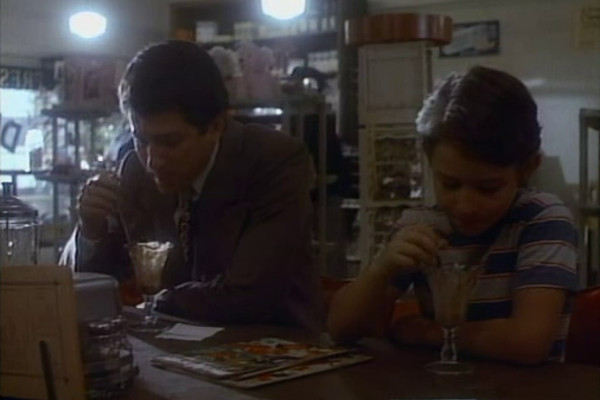
Based on a 1970 short story of the same name by Harlan Ellison, the script here is crafted by Alan Brennert, who wrote 11 of the first season stories. Ellison provides a commentary track on the DVD, revealing just how personal the story was to him, and how autobiographical. Discussing the anti-Semitic abuse he suffered at school, and the regular bullying he endured, he presents a picture of a hard life, where being beaten unconscious as a child was a regular occurrence. Ellison becomes emotional watching the episode and ends his commentary ten minutes before the climax, explaining how the lead character's wish to be able to speak to his father as a grown adult is based on his own desires.
Overall, it's a decent enough tale, even if the incidental score by Harry Betts can grate a little. Yet what holds it back is the undeniable similarity between the story and the original series classic Walking Distance. Although this one gives a happy ending, of sorts, that the original failed to provide, it lacks the 1959 episode's sense of artistry and genuine pathos. Too often with the 80s episodes the almost cinematic scale that the originals possessed is gone, and the riches of the images are lost after almost two decades of the video stock fading before it was cleaned up for release.
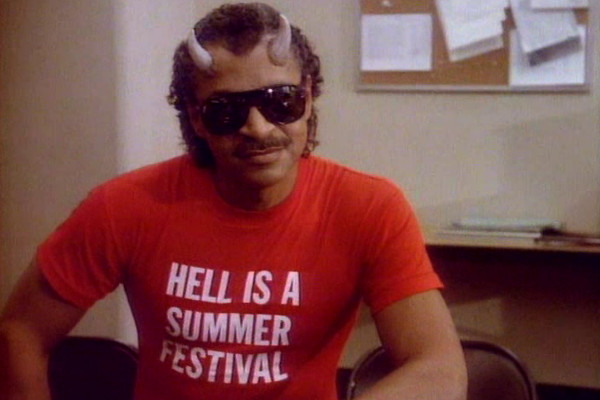
Another scrap of a story, just breaking the 8 minute mark, whereby a tutor unwittingly conjures up an agent of the Devil out to take his soul. When forced to ask the demon a task he can't perform, he gives a command the demon's limitless powers can't obey: "get lost". It's cute, and witty, and probably one of the better comedy episodes of the series, but it's more of a light distraction than a full-blooded story, a brief amusement rather than a compelling narrative.
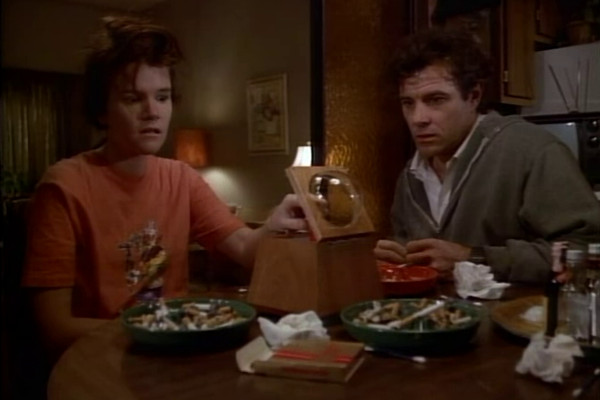
The central premise here sees a man offer an impoverished couple a box with a button on it: if they press it, someone they don't know will die, and they will be given $200,000. It's an engaging moral conceit, albeit one that perhaps doesn't exist in a realistic world. Perhaps as a result, this hypothetical question is presented via some truly eccentric acting choices, and what could be a gripping drama instead plays out as a camp comedy. Scriptwriter Richard Matheson disliked the final result, and was credited under a pseudonym: Logan Swanson.
Eighteen stories from this season were based upon pre-existing ones, this particular instalment coming from Matheson's own tale of the same name. The main difference between the TV production and the story is that the written version saw the wife press the button, and her husband killed... she receives her husband's life insurance and is assured that the person was a stranger to her as "do you really think you knew your husband?" One of Matheson's biggest issues was reportedly the changed ending to the TV episode, which had the veiled threat that the box will pass onto another random couple who "you don't know". It's a clever ending, which, although it discards the main point of the short story, arguably elevates it.
This wasn't the first adaption of Matheson's work, with a radio production coming just four years later in 1974 and titled "The Chinaman Button". This changed the amount offered to a million dollars, and took the unusual tack of changing the main point of view to the person offering the box, not the person being offered it. The million dollars was kept for a feature film adaptation in 2009 with Cameron Diaz and James Marsden, which looked to expand the story and offer an explanation behind the box's origins. Frequently sluggish in pace and with a climax that stretches to ludicrous areas of logic, The Box was the least of the adaptations, possibly a lesson that, while a fine idea, "Button, Button" doesn't really work when expanded beyond its basic premise.
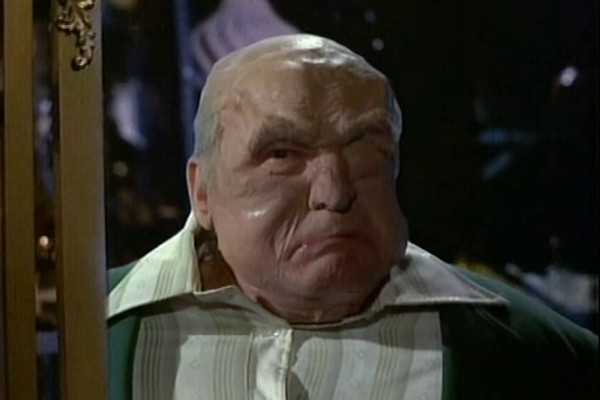
Wong's Lost and Found Emporium was written by Alan Brennert and based on a 1983 short story of the same name by William F. Wu. The commentary track features both writers in discussion, with Wu revealing that the question "where do lost things go?" was originally put to him years earlier as an exercise as part of a writer's workshop ran by Harlan Ellison. Wu's honesty in where his inspiration came from is refreshing, as he also reveals that his writer friend Alison Tillery suggested the episode's "head in a jar" for no other reason than the story needed more visual elements for television. This is perhaps the only detraction from an inventive story, in that most viewers will question what the point of the seemingly-random head is... not realising that there isn't one.
Featuring a mysterious shop - set in the back of a pornography store, no less - that sees people find things that they've "lost"... but those lost properties are abstract qualities like humour, respect, and, in the case of the title character, compassion. The episode can be a little heavy on the platitudes, though this is a charming throwback to some of the preachier excesses of the original series, and the set-up is duly original and quirky. It's also a story that doesn't hold back, directly referencing the murder of Vincent Chin from just three years earlier.
The idea was so popular that attempts to continue it were launched. William F. Wu wrote a sequel script called "Missing Person" for season two, but attempts to shoot it were curtailed when CBS cancelled the series. Many years later the Sci-Fi Channel were in talks with Alan Brennert to develop Wong's Lost and Found Emporium as a spin-off series, but it ultimately came to nothing.
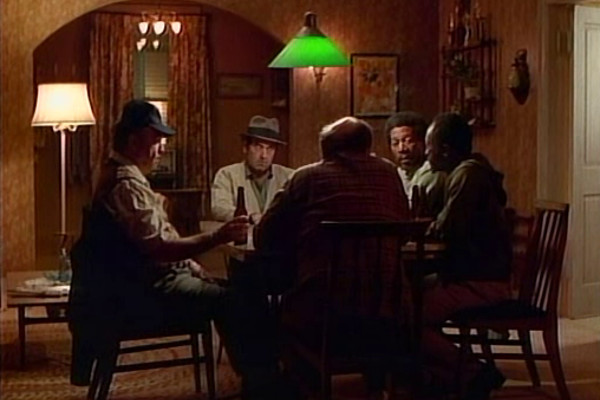
"What's the Devil doing here in New Jersey?"
"What are you talking about, Tony, I think he lives here."
A witty tale featuring the Devil at a card game, directed by Wes Craven. Although Craven was by then well known in the business and riding high off the back of A Nightmare on Elm Street, less well known was actor Morgan Freeman as one of the card players. Though by no means a complete unknown, he had appeared in just eight films at this stage, one of them uncredited, and was still someway off his breakthrough roles, despite wider experience in TV. Watched today, devoid of context, it appears as if the series has attracted an A-Lister, as with the opening, Shatterday, with Bruce Willis.
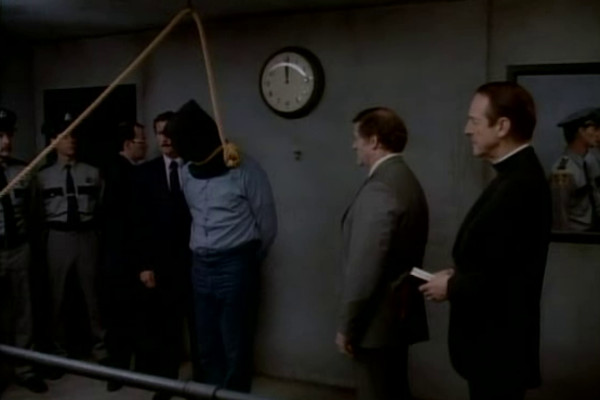
A largely faithful remake of the classic 1961 episode by Charles Beaumont, here written by James Crocker. This isn't just based on the story, but based on the actual screenplay, so many of the lines and events are identical. However, there are two main differences. On the surface, then the execution method of an electric chair has become a hangman's noose, but on a less superficial level there's more of a psychological explanation for events. In this tale of a man trapped in a recurring dream where he's sentenced to death, a possible explanation is given whereby his sister and father feature in guises in the dream in order to plague him.
Just under six years ago I wrote an overview of the 80s seasons for the Anorak Zone's TZ microsite. There I concluded that this episode "even manages to better the 60s version". Comparison between the two is never easy: the more naturalistic style of acting will occur in the 80s episodes, with a more theatrical level of performance in the 60s episodes, generally speaking. (Note that this is not a criticism of the 60s episodes, which are often very well acted, but in a more elaborate style of the period). From a production standpoint the 60s episodes will almost invariably look better, with all but six of them shot on film.
Yet crucially, by attempting to go someway towards explaining events, it either adds more depth to the concept, or takes away from the inherent strangeness of the set up, removing ambiguity and providing answers where no were needed. Six years ago I thought this was the right decision, but I've since changed my mind. Yet whether or not this compares with the original, it's still one of the best episodes of the season.
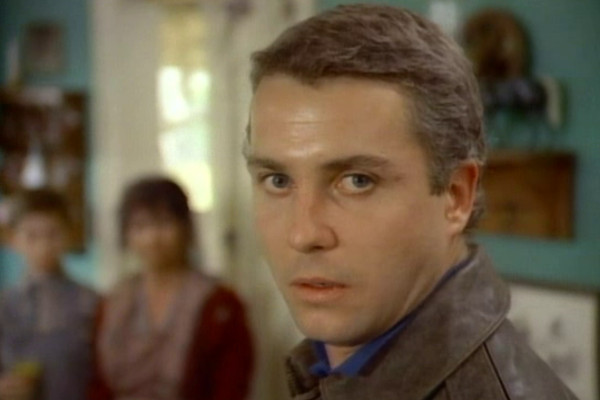
Often the 1980s Zone stories aren't strong enough to sustain a lengthy narrative, but the clever conceit of Need To Know is one of the finest ideas it had. While not wholly original, the concept of a phrase that, when heard, drives the listener insane, is a chilling one. The original question - to which we never hear the answer - was "do you know what God is?", but the network insisted it was changed to a less incendiary question about the meaning of life.
Starring a young William Petersen the same year as he was the lead in the movie Manhunter, it acts almost as a proto-X-Files as he forms an investigation partnership with an even younger Frances McDormand. Their fairly overt sexual chemistry never really quite comes off, and the script doesn't exactly demand a lot from them as actors, but they do fine in the roles. Especially chilling is the ending, which sees McDormand tell the secret to Peterson and Peterson look directly into camera before being driven insane.
This is more of an episode with enormous potential than a great one in execution, as lots of the "insane" residents of the town do unfortunately play their madness with an almost comic exaggeration rather than something truly chilling, leaving the episode a good, rather than great, one, and the question of what might have been. Less than a decade later the band Radiohead released a video to their song Just, which featured a similar theme where a man refused to stop lying down on a street pavement, and, when revealing the (unheard) reason why, was joined by a crowd of strangers who lay down with him.
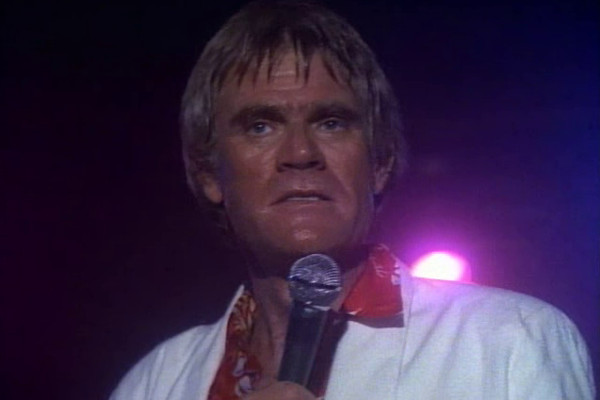
A joke-stealing comedian goes to Hell and has to perform his act based on pure honesty. Perhaps the biggest departure from the relatively wholesome original series occurs here, whereby the comedian (played by real-life stand up Tim Thomerson) has to talk about his experience with a "hooker" where he "broke her jaw in three places" and how he caused his own mother to die of hypothermia. Although obstensibly a comedy episode, there's nothing overtly "funny" here... it's a blistering black comedy that wastes not a second and sees the ultimate in purgatory with stories that are oh so real.